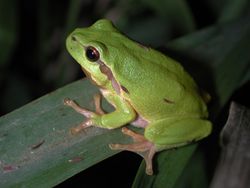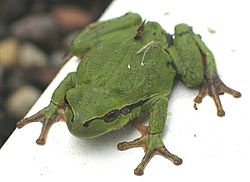European tree frog
The European tree frog, green tree frog, European green tree frog or common tree frog (Hyla arborea) is a tree frog from Europe Scientists have seen it in Crete and Greece and in Europe west of the middles of Poland and Romania.[3][1]
| European tree frog | |
|---|---|

| |
| Conservation status | |
| Scientific classification | |
| Kingdom: | Animalia |
| Phylum: | Chordata |
| Class: | Amphibia |
| Order: | Anura |
| Family: | Hylidae |
| Genus: | Hyla |
| Species: | H. arborea
|
| Binomial name | |
| Hyla arborea (Linnaeus, 1758)
| |
| Synonyms[3] | |
| |
The pupils of this frog's eyes go side to side and open up and down. It has discs on the toes of all four feet for climbing. This frog can be green or gray or brown or even near black depending on where it lives. Its belly is white or yellow. There is a dark stripe down each side of its body with white on the edges of the stripe. Adult male frogs have a dark-colored vocal sac on their throats and females do not.[1]
This frog lives in river valleys with many trees, but it also lives in gardens, parks, and places where humans grow fruit trees. It hides in the plants during the day and looks for food at night and in the evening. Because this frog can jump a long way, flying insects are a great part of its food.[1]
European Tree Frog Media
European tree frog (Hyla arborea) in Kapıçam National Park, Kahramanmaraş
Calling European Tree Frog
European tree frog (Hyla arborea) in Hesse, Germany
Formerly included in the European tree frog, the form molleri is now recognized as its own species, the Iberian tree frog
European tree frogs in Witte Veen
References
- ↑ 1.0 1.1 1.2 1.3 Sergius L. Kuzmin (November 10, 1999). "Hyla arborea: Common Tree Frog". Amphibiaweb. Retrieved November 24, 2020.
- ↑ Lua error in Module:Citation/CS1/Identifiers at line 630: attempt to index field 'known_free_doi_registrants_t' (a nil value).
- ↑ 3.0 3.1 "Hyla halowellii (Linnaeus, 1758)". Amphibian Species of the World 6.0, an Online Reference. American Museum of Natural History. Retrieved November 24, 2020.
+{{{1}}}−{{{2}}}








